Two geologists from the University of Cape Town in South Africa studying the African river drainage have accidentally stumbled upon an unsettling discovery: global warming will produce massive water shortages in Africa. Maarten de Wit and Jacek Stankiewicz created a new measure, called drainage density, which is capable of relating the rates of precipitation to the available surface water. The drainage density is the total length of a river per unit area. This is relevant because the rain on a certain area usually ends up in rivers.
"If you increase precipitation by [a factor of] two, you would have to add in more riverbeds to get rid of that water. So you would have a higher drainage density,'' de Wit said. "If you decrease the drainage, you don't need as many riverbeds to get rid of it all."
The point is that many climate models predict a reduction in rain falls of 10 to 20 percent over the next 50 years due to global warming and that many areas in Africa are highly dependent of surface water. This is because Africa does not have a large mountain range to produce snowmelt, rivers, and precipitation. "In Africa surface water is extremely important. Most of the people outside urban areas are still reliant on surface water for daily use", said de Wit.
The new measure allowed the scientists to draw quantitative conclusions about the availability of surface water based on the known reduction of rain falls.
And the results are rather disturbing. The hardest hit regions would be in northwestern and southern Africa. A 10 percent predicted reduction in rainfall in parts of Botswana would reduce the surface water flow to 23 percent of present day levels. A 20 percent decrease in rain fall in South Africa would leave Cape Town with just 42 percent of its river water. In parts of northern Africa, river water levels would also drop below 50 percent.
"It's like erasing large sections of the rivers from the map,'' de Wit said of the findings.
The most vulnerable regions to variations in rain fall are the ones that receive intermediate amounts of rain. In such areas the total length of rivers shrinks or expands sharply with rainfall. About 25 percent of Africa (affecting 75 percent of its countries) is in this category. The decrease in river water will also have grave implications for many animal species whose habitats rely on regular water supplies. "The Cape is a biodiversity hotspot," de Wit said. "Will it be there in 50 years?''
This study has many politicians worried because, as many African rivers cross international boundaries, a crisis in water supplies is likely to lead to an increase in international conflicts. Adil Najam, a professor of negotiation and diplomacy at Tufts University in Medford, Massachusetts said: "Many people in Africa spend more time and money on acquiring water than nearly any other resource. If water becomes more scarce or expensive, people will do what they must to obtain it. Water is nonnegotiable. If you are poor, you don't stop drinking water."
Photo credit: Henrik & Lasse

 14 DAY TRIAL //
14 DAY TRIAL //